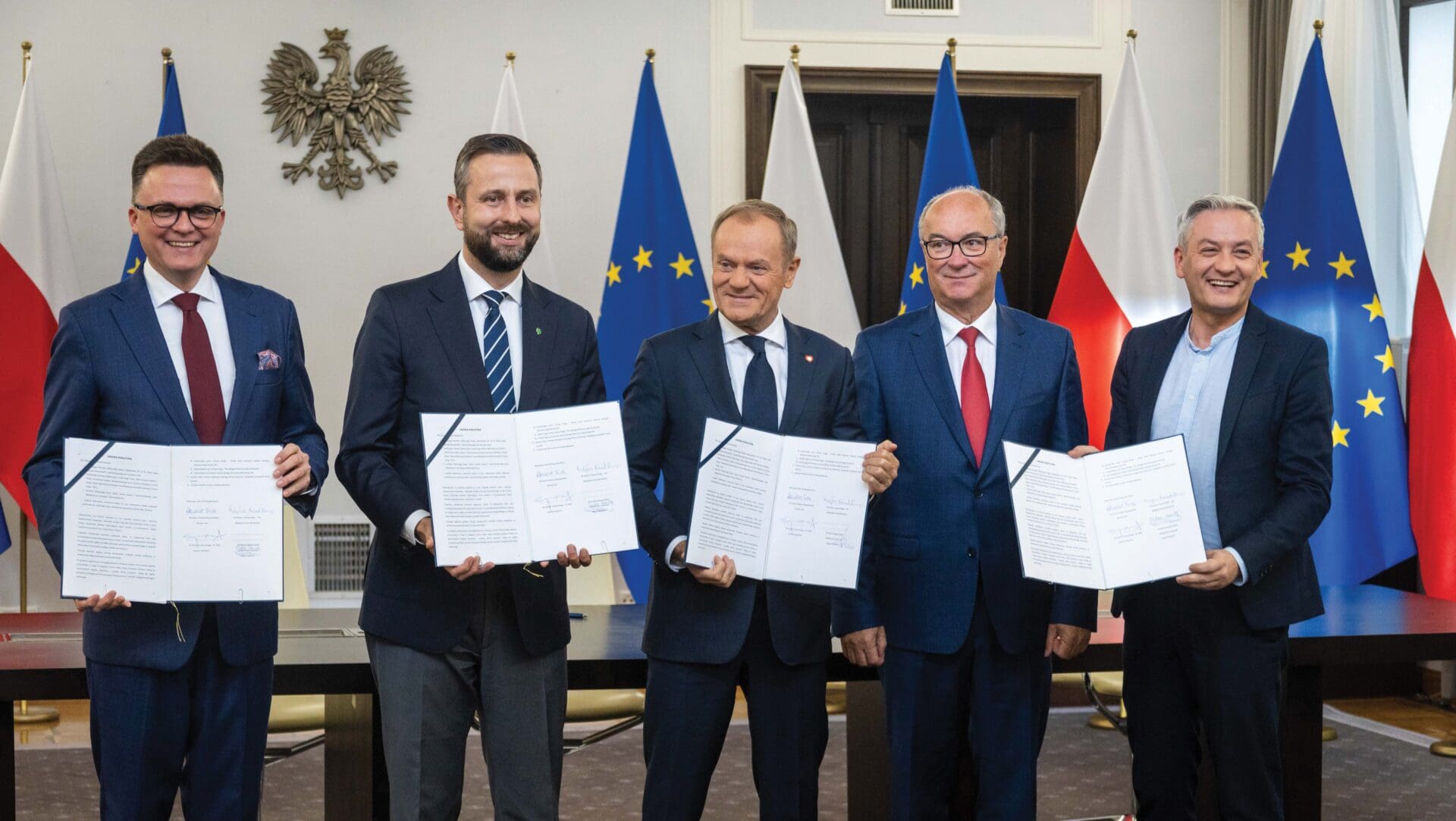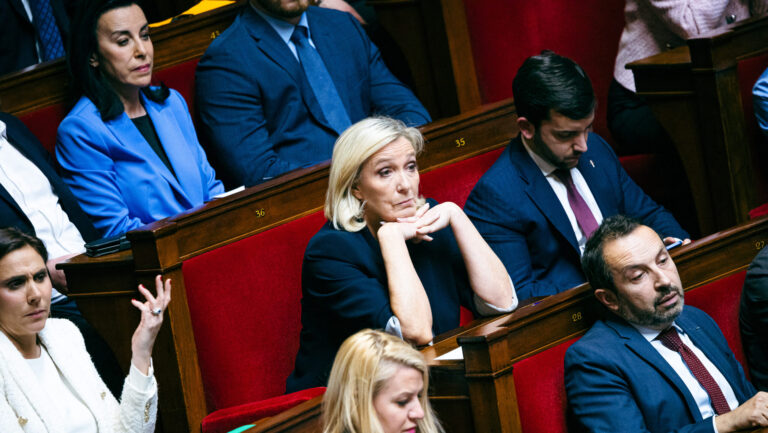This article was published in Vol. 3 No. 4 of our print edition.
On 15 October, Poland became the second—after Spain—large European country to hold parliamentary elections this year (Editor’s note: in 2023). As in the Spanish case, conservatives found reason for disappointment. The results certainly spelled the end of the eight-year rule of the Law and Justice (PiS) Party and eliminated, for the moment, Hungary’s key European alliance.
Unlike in Spain, polls proved largely accurate. PiS won the highest vote total at 35.38 per cent,1 thereby becoming the first post-communist party to do so in three consecutive elections. The primary opposition force, Civic Coalition (KO), finished second at 30.7 per cent. These results tracked very closely with months of polling. The composition of Poland’s next government always promised to hinge on the performance of smaller parties, and that was indeed the case. The biggest over-performer, relative to polls, and ultimate kingmaker was the centrist-agrarian Third Way (TD) coalition, an amalgam of two parties. Many analysts asserted that the question of whether or not TD could cross the eight-per-cent threshold required for participation in a coalition government would decide the electoral outcome. In fact, TD secured 14.4 per cent. ‘Without the Third Way, there would not have been such a victory. We said it from the beginning, [but] not everyone believed it’, said TD co-leader Władysław Kosiniak-Kamysz.2
Conversely, the populist-right Confederation Party suffered the most obvious underperformance. Summer polls often suggested it would gain double-digit support, but it seemingly peaked too early. It won just 7.16 per cent, mooting its status as the only realistic coalition partner of PiS. The Left alliance won 8.61 per cent, rounding out the major competitors. KO, TD, and the Left have maintained an alliance in the first-past-the-post Senate for several years, thus preventing a PiS majority in that chamber. That result became even more pronounced this year, as the senatorial elections yielded to PiS a mere 34 out of 100 seats for the coming term.3 Such a construction was widely expected in the Sejm (parliament) as well, something the parties finalized in their coalition agreement on 10 November. As PiS maintains a bitter rivalry with KO and is ideologically incompatible with the Left, only TD—particularly its agrarian Polish People’s Party faction—offered a theoretical negotiating partner. Yet TD campaigned as an anti-PiS force. ‘Either Third Way or a third term of PiS’, read one of its slogans.4 Joining PiS in government would have represented a betrayal of voter expectations; party statements both before and after the elections ruled out such a move.
The three major opposition parties were united in opposition to PiS. Once the votes were tallied, the difficulties of multilateral governance began to manifest themselves. ‘KO and the Left support abortion up to the twelfth week?’ asked Kosiniak-Kamysz during a radio interview in which he discussed coalition negotiations.5 ‘No ideological issues can ever be the subject of a coalition agreement. I will not agree to any ideological issues being included in coalition agreements.’ Anna Maria Żukowska, a parliamentarian from the Left, quickly retorted, ‘On that same basis… farmers’ issues, or whatever you want to include in the contract’.6 After some public speculation, the parties coalesced around Tusk as their prime-ministerial candidate, but other ministerial positions were subject to intense negotiation. TD’s role in securing an opposition majority and KO’s decided lack of a mandate made the former bullish in negotiations. In an unusual construction, TD’s Kosiniak-Kamysz (of the Polish People’s Party faction) and the Left’s Krzysztof Gawkowski will serve together as deputy prime ministers. TD’s Szymon Hołownia (of the Poland 2050 faction) and the Left’s Włodzimierz Czarzasty will rotate in the influential post of speaker of the Sejm, the figure who determines the body’s legislative agenda. Two KO figures will rotate as speakers of the Senate. Such a cumbersome arrangement could create issues of governmental stability. It also produces the ironic effect of pairing a prime minister from KO, which has its roots in the Solidarity movement, with a speaker from the Left, which is a direct descendant of the communist-era Polish United Workers’ Party.
As in many European countries, Polish convention (not law) stipulates that the president offers the largest vote recipient an opportunity to form a government. Once results were confirmed, opposition figureheads immediately demanded that President Andrzej Duda, who is affiliated with PiS, disregard this formality. On 6 November, Duda officially entrusted the mission of forming a government to current Prime Minister Mateusz Morawiecki. ‘None of the committees won an independent majority’, said Duda during his announcement. ‘Thus, I decided to continue the good parliamentary tradition, according to which the winning party is the first to be given the opportunity to form a government. It is just as I announced during the election campaign, and it has always been the case since the adoption of the current constitution of the Republic of Poland.’7
‘Unwilling to discount months of fearmongering, the former opposition is already at work on its post-election narrative’
Commentary on the Polish right indeed speculated that PiS might somehow cobble together a government if given President Duda’s blessing, a far-fetched hope that vanished entirely with the 10 November coalition agreement, as has the hope that the opposition camp might fracture now that the uniting substance of opposition to PiS has ceased to be a primary consideration. Journalist and author Jakub Maciejewski outlined four reasons why such delays might be politically expedient for PiS.8 First, ‘programmatically and personally, more divides than unites the opposition,’ as evidenced by the public dispute between Kosiniak-Kamysz and Żukowska. Second, any delay in the formation of a Tusk-led government hinders EU centralization efforts, particularly planned reforms that would add to the body’s ever-growing list of competencies. Third, if there is truth to rumours that Tusk will be nominated to replace Ursula von der Leyen as president of the European Commission, the intended progression of prime minister to commissioner might be complicated. Finally, a shortened period of control in 2023 will thwart the new government’s desired budget cuts, including cuts to PiS-instituted programmes like the ‘800+’ family benefit payments.
To be sure, such political advantages would be modest at best. If they stoke opposition fearmongering to the point of public sympathy, they might stray into counterproductive territory. American journalist and author Anne Applebaum, who is married to a KO politician and former defence minister, was among the most hysterical voices9 decrying ‘democratic backsliding’ and ‘state capture’ prior to the elections; she has asked, ‘What is [President Duda] trying to buy time for?’10 German journalist Nancy Waldmann asserts that ‘PiS is buying time to build barricades on the future.’11 Some of the most unhinged anti-PiS voices have speculated the departing government might attempt an armed takeover or delay its exit to burn sensitive documents.12 Unwilling to discount months of fearmongering, the former opposition is already at work on its post-election narrative. According to Applebaum, ‘Poland’s ruling party tried, and failed, to manipulate an election.’13 The simplest explanation—that her side simply triumphed under the umbrella of a healthy democracy—seems not to have occurred to her.
Post-Election Jockeying
Holding the presumed new government and its allies accountable for hypocrisy will be among the priorities for Polish conservatives as they enter opposition. Once the power transition issue subsides, revenge is likely to become a central issue in Polish politics. Among the presumed incoming government’s proposals are journalistic purges and political show-trials, precisely the sort of banana-republic behaviour anti-PiS voices have long alleged on the part of the outgoing government. Leading figures from the united opposition have floated the idea of liquidating public broadcaster TVP. Even if they reject such a drastic move, they will surely stack the broadcaster with sympathetic figures. As key corporate media outlets already have a leftist bent,14 the right will lack major voices in the Polish media landscape. PiS leader and onetime Prime Minister Jarosław Kaczyński has called for the creation of a conservative media network composed partially of fired TVP figures.15 Without concrete funding proposals, such an idea seems fanciful. Leftist daily Gazeta Wyborcza, Poland’s largest traditional news publication, published a list of officials whom it declares should be fired, because ‘they had worked with or been appointed by the PiS government.’16 The list featured many public-media figures but also included employees of the postal service and public-finance body. ‘Overnight, you will get the public media back,’ boasted Tusk during the campaign. ‘Everyone will be booted out of there.’17
‘Signs from the United States and China suggest that unfavourable economic conditions lie ahead’
More menacingly, the peddlers of ‘democratic backsliding’ narratives are eager to use newly gained power to prosecute political opponents.18 Tusk’s KO promised, in its campaign platform,19 to establish a state tribunal that would prosecute President Duda and Prime Minister Morawiecki, among other PiS figures. Kaczyński is among those slated for ‘an independent, depoliticized prosecution,’ purportedly ‘for masterminding and attempting to change the political system of the state’. Such revenge tactics are even more likely to materialize since Duda’s role as president will prevent contentious legislation from passing in the Sejm until at least 2025.
Brussels has felt emboldened to flex its muscles too. The European Parliament voted to waive, under the auspices of ‘hate speech,’ the legal immunity of four PiS MEPs for liking a 2018 Twitter post their own party published to highlight migrant crime in Europe.20 In a bizarre twist, the complaint arose from a Polish left-wing NGO activist who had previously been imprisoned. ‘The entire matter is a result of me “liking and sharing” my own party’s spot on Twitter,’ said MEP Beata Kempa. ‘Immunity for us is created so no Member of the European Parliament can be prosecuted for exercising freedom of speech in political matters.’ Furthermore, the sentiments in the ad reflect a position ‘with which the majority of the society I represent agrees.’ ‘This is Orwell in its purest form,’ added MEP Patryk Jaki. In a parallel development, Włodzimierz Karpiński, a treasury minister from a previous Tusk government who was arrested on corruption charges, will be able to enter the European Parliament directly from prison, thereby receiving legal immunity.21 Karpiński’s lawyer confirmed his client will accept the mandate; only a majority parliamentary vote can remove his immunity. Current Minister of Justice Zbigniew Ziobro asserted that the criminal-parliamentarian cannot be expected to vote for Polish interests; it is a claim PiS figures have made repeatedly about the incoming government.22
What Next for Polish Conservatives?
This new role of opposition affords Polish conservatives the opportunity to showcase the aforementioned hubris of their opponents and undertake a period of reinvention. Hungarians remember well Prime Minister Viktor Orbán’s period of reflective opposition from 2002–2010, something the Poles should emulate. PiS arguably requires more significant reinvention than did Orbán’s Fidesz. Its governing style often seemed petty and overbearing. Frivolous controversies earned far too much time in the public consciousness; for example, the cat-loving Kaczyński spearheaded a 2020 animal welfare bill that alienated key agricultural constituencies and threatened to divide the ruling government.23 This summer, the government misfired with its establishment of a Russia-collusion tribunal ostensibly aimed at Tusk; though copied directly from the American Democratic Party’s playbook, it fed into opposition narratives and created an unnecessary political firestorm.24 The government backpedalled, but not until after Tusk had staged a ‘Freedom March’ with adulatory international media coverage.
During its eight years of single-party rule, PiS oversaw previously unimaginable economic vitality, a response to the Ukraine War that was broadly popular in Polish society, and the continued growth of Poland as a power-broker in Europe. Polish emigrants returned from destinations like the United Kingdom and Ireland.25 Despite all this, the elections were arguably a referendum on the political personality of PiS, something that increasingly grated on Polish voters. A Hungarian observer might reasonably conclude that, faced with identical circumstances, Viktor Orbán’s Fidesz would have secured victory in such an election.
Two issues should particularly characterize the reinvention process: migration and the economy. The prevailing landscape of this opposition period should offer political opportunities for both. Migration should be a winning issue for Polish conservatives. In these elections, though, it flopped. The issue was not among voters’ top reported priorities. The involvement of PiS officials in a visa scandal, and shocking statistics about the extent of legal immigration in recent years, damaged the ruling government’s anti-migration image.26 A referendum with two migration-related questions failed to reach the requisite participation threshold. Most Poles, irrespective of overall political leaning, are opposed to accepting migrants. In fact, PiS stormed to power in 2015 after the Tusk-aligned government unexpectedly agreed to the EU migrant-redistribution scheme. Migration pressures were already building before the war in Israel, and it seems only a matter of time before the next enormous wave of young, Middle Eastern men descends on Europe. Expect Brussels and KO not to make the same mistake this time. They will presumably develop a symbolic carve-out Tusk can flaunt to Polish voters. The ability of PiS and its allies to communicate effectively on this issue will partially define their success in opposition.
Signs from the United States and China suggest that unfavourable economic conditions lie ahead. An economic downturn would strain the new ruling coalition and offer PiS an opportunity to offer a constructive message about the economic vitality during its tenure, as well as Warsaw’s economic relationships with Brussels and Berlin. Robert Bąkiewicz, a journalist and PiS politician who cuts a figure of a conservative rising star, has communicated just such a message on topics like monetary independence and Poland’s export relationship with Germany.27 Tangible economic solutions for Polish voters, rather than the political skirmishes that have recently characterized PiS, will be essential for repairing the party’s damaged political brand.
For Hungary, this is an unmitigated disaster. While Robert Fico’s return to power in Slovakia offers some reason for optimism, Hungary’s northern neighbours certainly will not replace the Poles as steadfast, influential allies in Europe. Giorgia Meloni’s Italy and the new government in the Netherlands likewise promise to be only occasional counterweights to Brussels. Next year’s scheduled parliamentary elections in Austria and Croatia might offer some limited regional solidarity. Yet, no other country can fill these Poland-sized shoes. The két jó barát (two good friends, i.e. Poland and Hungary), will be left hoping for early elections.
Note: This analysis was completed on 15 November 2023, in time for publication deadlines.
NOTES
1 ‘Znamy wyniki wyborów. Przeliczono 100 proc. głosów’, Do Rzeczy (17 October 2023), https://dorzeczy.pl/kraj/493383/wyniki-wyborow-pkw-ma-juz-dane-ze-100-proc-obwodow.html.
2 ‘Kosiniak i Hołownia pełni entuzjazmu. “15 października skończyły się kłótnie i rozdawnictwo”’, Do Rzeczy (15 October 2023), https://dorzeczy.pl/opinie/492810/wybory-holownia-skonczyly-sie-klotnie-i-rozdawnictwo.html.
3 ‘Znamy wyniki wyborów. Przeliczono 100 proc. głosów’, Do Rzeczy (17 October 2023), https://dorzeczy.pl/kraj/493383/wyniki-wyborow-pkw-ma-juz-dane-ze-100-proc-obwodow.html.
4 ‘Albo Trzecia Droga, albo trzecia kadencja PiS. Rozmowa z Władysławem Kosiniakiem- Kamyszem’, Dziennik Gazeta Prawna (11 October 2023), www.gazetaprawna.pl/wiadomosci/kraj/artykuly/9318766,albo-trzecia-droga-albo-trzecia-kadencja-pis-wywiad-wladyslaw-kosiniak-kamysz.html.
5 ‘Już się zaczęło! Żukowska kłóci się z Kosiniakiem-Kamyszem o aborcję w umowie koalicyjnej. “Jak sprawy rolników?”’, wPolityce (17 October 2023), https://wpolityce.pl/polityka/667079-zukowska-kloci-sie-z-kosiniakiem-kamyszem-o-aborcje-w-umowie.
6 ‘Już się zaczęło! Żukowska kłóci się z Kosiniakiem-Kamyszem o aborcję w umowie koalicyjnej. “Jak sprawy rolników?”’, wPolityce (17 October 2023), https://wpolityce.pl/polityka/667079-zukowska-kloci-sie-z-kosiniakiem-kamyszem-o-aborcje-w-umowie.
7 ‘Orędzie prezydenta. Wiemy, komu powierzy misję formowania rządu’, Do Rzeczy (6 November 2023), https://dorzeczy.pl/opinie/500190/prezydent-powierze-misje-formowania-rzadu-premierowi-morawieckiemu.html.
8 ‘Zwłoka w przekazywaniu Tuskowi władzy ma sens. PiS prowadzi politykę do ostatniego dzwonka’, wPolityce (5 November 2023), https://wpolityce.pl/polityka/669562-opozniac-powolanie-rzadu-tuska-po-stokroc-warto.
9 ‘Poland’s Opposition Readies Kangaroo Courts’, The American Spectator (12 October 2023), https://spectator.org/poland-opposition-readies-kangaroo-courts/.
10 Anne Applebaum on X: (26 October 2023), https://twitter.com/anneapplebaum/status/1717505519726829989.
11 ‘“Nie jest skromny”. Niemieckie media uderzają w prezydenta Dudę’, Do Rzeczy (8 November 2023), https://dorzeczy.pl/opinie/500805/niemieckie-media-uderzaja-w-prezydenta-dude.html.
12 ‘Zwłoka w przekazywaniu Tuskowi władzy ma sens. PiS prowadzi politykę do ostatniego dzwonka’, wPolityce (5 November 2023), https://wpolityce.pl/polityka/669562-opozniac-powolanie-rzadu-tuska-po-stokroc-warto.
13 Anne Applebaum on X: (30 October 2023), https://twitter.com/anneapplebaum/status/1719035963886694731.
14 ‘Poland’s Opposition Readies Kangaroo Courts’.
15 ‘Poland: Kaczyński Blames “Foreign Influence” for Electoral Loss’, Brussels Signal (23 October 2023), https://brusselssignal.eu/2023/10/poland-kaczynski-blames-foreign-influence-for-electoral-loss/.
16 ‘Leading Polish Liberal Newspaper Prepares Blacklist of Conservatives to Be Sacked’, Remix News (30 October 2023), https://rmx.news/poland/leading-polish-liberal-newspaper-prepares-blacklist-of-conservatives-to-be-sacked/.
17 ‘Tusk mówił o mediach publicznych. Przedstawił swój “plan”. Przywołał hasło…TVN’, Polskie Radio 24 (28 September 2023), https://polskieradio24.pl/5/1222/artykul/3251081,tusk-mowil-o-mediach-publicznych-przedstawil-swoj-plan-przywolal-haslo-tvn.
18 ‘Poland’s Opposition Readies Kangaroo Courts’.
19 ‘100 konkretów na pierwsze 100 dni rządów!’, Koalicja Obywatelska (2023), https://100konkretow.pl/wszystkie-konkrety/.
20 ‘Europosłowie PiS: W PE podeptano wolność słowa. Pozbawiono nas immunitetu za polubienie spotu. To jest Orwell w czystej postaci’, wPolityce (9 November 2023), https://wpolityce.pl/ polityka/670039-europoslowie-pis-pozbawiono-nas-immunitetu-za-lajka-na-tt.
21 ‘Wybory 2023. Włodzimierz Karpiński może zostać europosłem. Od kilku miesięcy jest w areszcie’, Polsat News (19 October 2023), www.polsatnews.pl/wiadomosc/2023-10-19/wybory-2023-wlodzimierz-karpinski-moze-zostac-europoslem-od-kilku-miesiecy-jest-w-areszcie/https://www.polsatnews.pl/wiadomosc/2023-10-19/wybory-2023-wlodzimierz-karpinski-moze-zostac-europoslem-od-kilku-miesiecy-jest-w-areszcie/.
22 ‘Az Európai Parlamentbe menekülhet a börtönből a Tusk-kormány egykori minisztere’, Mandiner (9 November 2023), https://mandiner.hu/kulfold/2023/11/az-europai-parlamentbe-menekulhet-a-bortonbol-a-tusk-kormany-egykori-minisztere.
23 ‘Animal Rights Bill Threatens to Break Poland’s Ruling Coalition’, Politico (18 September 2020), www.politico.eu/article/animal-rights-bill-threatens-to-break-polands-ruling-coalition/.
24 ‘The West to Poland: Democracy for Me, Not for Thee’, The American Conservative (20 June 2023), www.theamericanconservative.com/the-west-to-poland-democracy-for-me-not-for-thee/.
25 ‘Poland’s Reverse Brain Drain: Meet the Poles Returning Home to Work in Its Booming Tech Sector’, Euro News (3 February 2023), www.euronews.com/next/2023/02/03/polands-reverse-brain-drain-meet-the-poles-returning-home-to-work-in-its-booming-tech-sect.
26 ‘Chaos Ensues as Poland Vote Looms’, The American Spectator (3 October 2023), https://spectator.org/chaos-ensues-as-poland-vote-looms/.
27 Robert Bąkiewicz on X: (8 November 2023), https://twitter.com/RBakiewicz/status/1722276193330937885.
Related articles:








